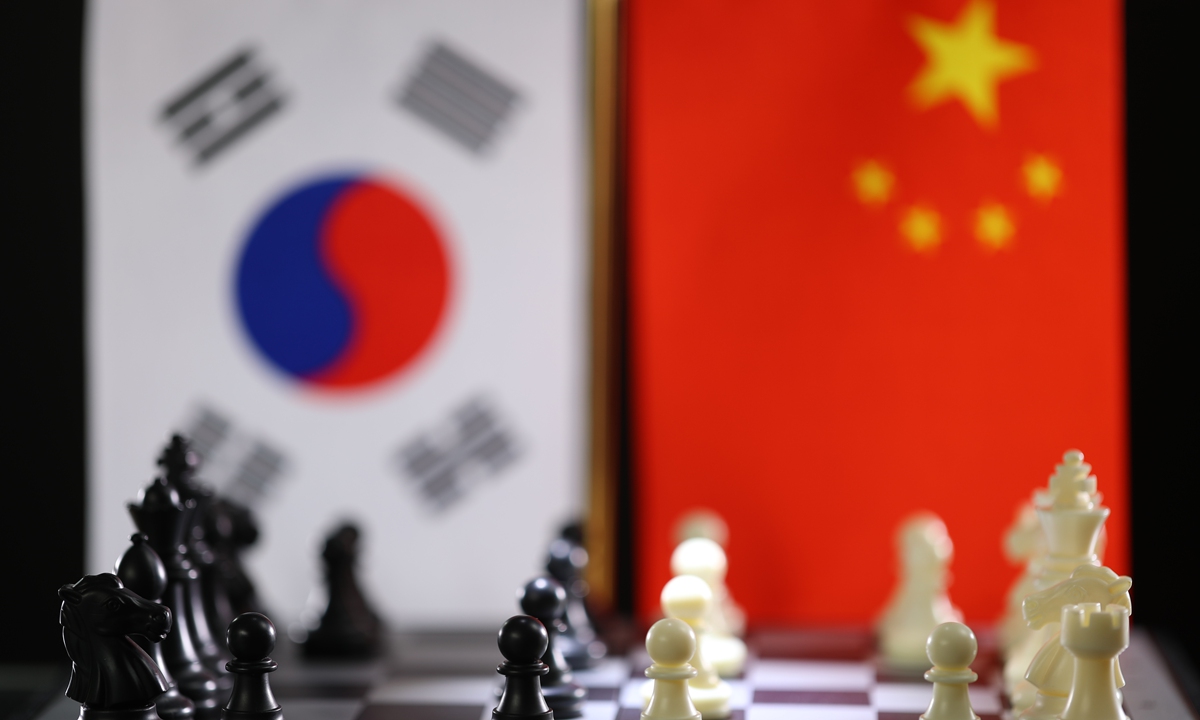Seoul unveils Indo-Pacific Strategy; experts say group confrontation is against South Korea’s interests

China-South Korea Photo: VCG
South Korea on Wednesday unveiled details of its so-called Indo-Pacific Strategy. Chinese observers said Seoul's best interest lies in balancing itself between China and the US and warned camp confrontation is against Seoul's interests.
Kim Sung-han, the head of the South Korean National Security Office (NSO), on Wednesday announced the completion of the final report on the nation's first unilateral diplomatic strategy applied to a particular region, local media KBS reported.
In the final report on the strategy, the South Korean government said it will pursue nine core lines of effort to fulfill its vision for a free, peaceful and prosperous Indo-Pacific region under the three cooperation principles of inclusiveness, trust and reciprocity.
The nine lines include building a regional order based on norms and rules, cooperating to promote the rule of law and human rights, strengthening nonproliferation and counterterrorism efforts across the region and expanding comprehensive security cooperation.
The strategy emphasizes the strengthening of unity and cooperation among countries that share the same values, saying that this will help consolidate the rules-based regional order and safeguard national interests.
On South Korea's unveiling of its "Indo-Pacific Strategy," Chinese Foreign Ministry spokesperson Wang Wenbin commented during a routine press conference on Wednesday that China advocates solidarity and cooperation among all countries, and opposes the establishment of exclusive cliques.
"It is hoped that South Korea will work with China to promote the healthy and stable development of relations, and jointly make positive contributions to promoting regional peace, stability, development and prosperity," he said.
As an ally of the US, South Korea is not the first nor will it be the last to roll out a so-called Indo-Pacific Strategy, and Seoul's move on Wednesday is in line with expectations, Dong Xiangrong, a senior fellow at the National Institute of International Strategy at the Chinese Academy of Social Sciences, told the Global Times on Wednesday.
The final report comes about a month after South Korean President Yoon Suk-yeol announced the basic outlines of the strategy during a summit with Southeast Asian leaders in Cambodia. Yoon's strategy is widely considered as echoing that of the US and Japan.
However, the South Korean presidential office reportedly denied on Wednesday that the strategy seeks to exclude or contain a particular nation, as the strategy also highlighted the principle of engagement, pledging to cooperate with neighboring China.
"With China, a key partner for achieving prosperity and peace in the Indo-Pacific region, we will nurture a sounder and more mature relationship as we pursue shared interests based on mutual respect and reciprocity, guided by international norms and rules," the report said.
Seoul has a tradition of seeking a certain balance between Beijing and Washington. However, its security, diplomatic strategy, in essence, is pivoting toward the US, and the trilateral cooperation with US and Japan is the very pillar of that, Dong noted.
The roll-out of its own Indo-Pacific Strategy can be also viewed as part of Seoul's pursuit of becoming a power nation, bolstering its influence in the region and part of its overall strategy of building itself into a Global Pivotal Power, which shows its ambition to elevate its global status, Dong said.
However, Chinese observers warned that South Korea should be clear about the fact that its national interests do not entirely equate to those of the US.
Recklessly following the US and fanning the flames of camp confrontation in the region is harmful to its national interests, and Seoul should tread cautiously and strive to ease regional tension, otherwise it is about to make major mistakes in its strategy, they warned.
Data issued by the China's General Administration of Customs shows that trade between China and South Korea surpassed $360 billion in 2021, which is 72 times the figure in 1992 when diplomatic ties were established.
South Korea's exports to China have increased more than 160 times since the two countries set up diplomatic ties 30 years ago, much higher than the growth rate of Seoul's overall overseas shipments, Yonhap News reported in August, citing data from the Korea International Trade Association. China has been South Korea's largest export destination since 2003.
South Korea and China are neighboring countries and they are sharing close connections not only in the economy and trade sectors, but also have common concerns in the security sphere. "China is where South Korea's real interests lie, and Seoul's best strategy is to balance its ties between China and the US," Dong said.




